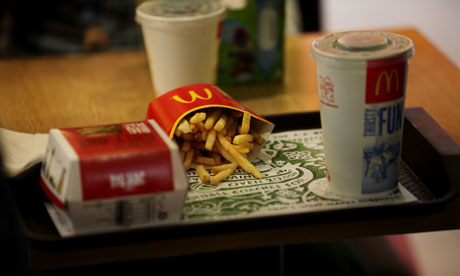
So is this all that Andrew Lansley's tackling of the big boys of fast food amounts to – a measly chart for counting calories in fast food outlets such as McDonald's? When Lansley announced his initiative last year for combating obesity, I was hoping to see more cooking equipment for schools and fully equipped kitchens for teaching the basics of home cooking.
Unfortunately, this empty gesture – part of the government's 'responsibility deal' on public health – will not help to stem the rapid rise in obesity in the UK and is misleading. This is because, among other things, calorie-counting just does not work when it comes to losing weight – much more important is the nutritional content of the food we eat.
What fast food outlets fail to tell their customers is that the food they are consuming contains empty calories – the kind that lead to obesity. The problem here is not just about being overfed but also about being undernourished.
With growing food insecurity linked to rising food prices, the poorest of the world's population have started to rely more on fast food because they mistakenly believe it to be cheaper than healthier equivalents. Global food giants are taking advantage of their ignorance. And, as fast food outlets grow in countries such as China, the strain on the planet's resources will only increase.
The links between poverty and obesity cannot be ignored, especially in times when people are being forced to change their food shopping and eating habits in order to keep to tight budgets.
We need practical guidelines, showing people how to cut down on food costs without cutting down on their nutritional intake and this information should start at school and be available for all ages.
It's really important because it's not just about slimmer waistlines and longer, healthier lives – regular consumption of junk food has been shown to have a detrimental effect on children's brains. Adults do not get off lightly either – obesity in middle age has been linked to Alzheimer's disease.
If the government really wishes to reduce obesity rates, it had better start telling people to consume fast food only once a week as part of a healthy, balanced diet. There is no need to cut out fast food completely: it is only when these foods are eaten on a daily basis that the harm is done. Fast food outlets could join in too, rather than relying on labelling (not much chance of that!).
The government should be savvy and encourage people to eat and cook food that is locally sourced and in season – at its freshest and its cheapest. This will also help to generate income for local communities. Also, and importantly, there should be a drive for people to eat more wholefoods.
Wholefoods – foods that are unadulterated before they are eaten, or where refining is kept to a minimum – actually contain fewer calories gram per gram than their refined equivalent. For example, 100g of wholemeal flour has far fewer calories than 100g of white flour. This is because wholefoods take longer to digest.
The government must act fast and with precision to truly combat the obesity problem. What people need are the real, honest facts about food nutrition, and the links between poverty and nutrition properly addressed with correct information, including more practical, "hands on" education. If you do not have the real facts about calories versus nutritional content, you will not be able to make real choices and will be at the mercy of the junk food giants.

